近义词辨析练习
高考语文近义词辨析练习及答案
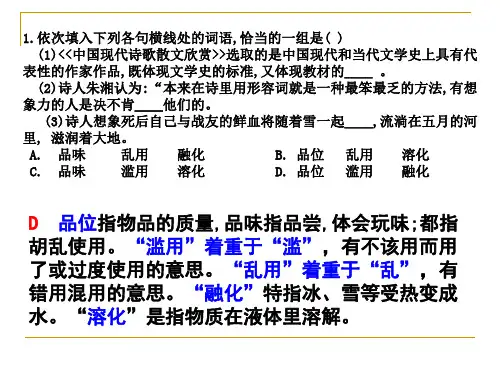
12.依次填入下列各句横线处的词语,最恰当的是( ) (1)《腾野先生》的神表面看似乎是作者对老师的回忆与思念,其实不然, ____散文的真正线索是他那种强烈的爱国主义感情。 (2)《动人的北平》从头到尾都____着一种极其深厚的感情,那是学养丰 厚的作者对文化故都和故都文化,乃至中华文明的敬仰、赞美之情。 (3)萧红《回忆鲁迅先生》____的结尾所潜隐的难以言表的悲袞与怀 A 贯串 贯穿 简捷 B 贯穿 贯串 简洁 C 贯穿 贯串 简捷 D 贯串 贯穿 简洁
随便地混过去。
A.阅历 忽视
藐视
B.经历 无视 蔑视
C.阅历 无视
藐视
D.经历 忽视 蔑视
A 阅历:指懂得或掌握某种技能或才能并加以实 践的过程
经历:指亲身体验某人或某事的时间过程阅历作 名词,经历作名词动词亦可;
忽视指不重视,无视不认真对待; 藐视就是小看 的意思,蔑视就是不屑一顾,不拿他当回事。
A 考查 肤浅 徜徉
B 考察 肤浅 徜徉
C 考查 浮浅 徘徊
D 考察 浮浅 徘徊
B 肤浅:(学识)浅,理解不深。 浮浅:(思想作风、文章风格)浅薄、不切实。
7.依次填入横线处的词语恰当的一项( ) (1)从诗作中接收了语言文字的信息,还不等于迈进了诗国的大门;只 有受语言文字信息的引发头脑中____出相关的意象,才真正进入了审美阶 段。 (2)当诗人抽去有形的连线把相距较远的事物放在一起时,聪明的读者 照样能正确____ 。 (3)离协和医院一箭之地,有些旧式的玩铺,古玩商人抽着水烟袋,仍 然____旧法去营业,谁去理那回事! A 浮现 领悟 沿用 B 显现 领悟 延用 C 浮现 领会 延用 D 显现 领会 沿用
D “贯穿”指穿过,连通,如“这条公路贯穿全省12个 县”;“贯串”指从头到尾穿过一个或一系列事物,如“ 这篇讲话贯串着民本思想”。
初中常考近义词辨析练习(6)含答案
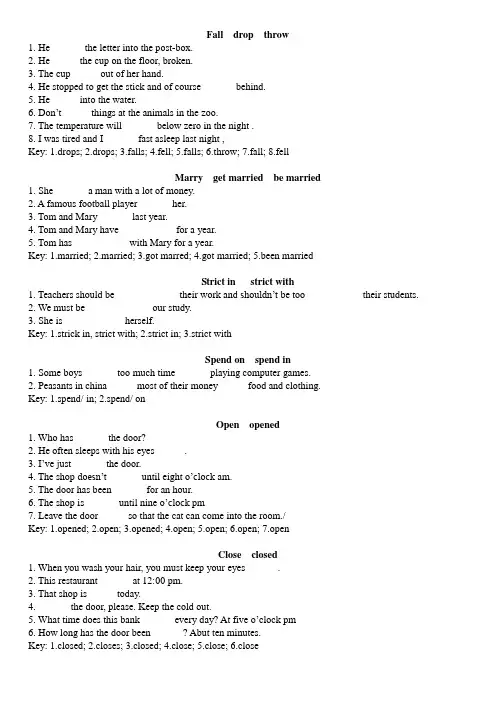
Fall drop throw1. He ______ the letter into the post-box.2. He _____ the cup on the floor, broken.3. The cup _____ out of her hand.4. He stopped to get the stick and of course ______ behind.5. He _____ into the water.6. Don’t _____ things at the animals in the zoo.7. The temperature will ______ below zero in the night .8. I was tired and I ______ fast asleep last night ,Key: 1.drops; 2.drops; 3.falls; 4.fell; 5.falls; 6.throw; 7.fall; 8.fellMarry get married be married1. She ______ a man with a lot of money.2. A famous football player ______ her.3. Tom and Mary ______ last year.4. Tom and Mary have _____ _____ for a year.5. Tom has _____ _____ with Mary for a year.Key: 1.married; 2.married; 3.got marred; 4.got married; 5.been marriedStrict in strict with1. Teachers should be ______ ______their work and shouldn’t be too _____ _____ their students.2. We must be ______ ______ our study.3. She is _____ ______ herself.Key: 1.strick in, strict with; 2.strict in; 3.strict withSpend on spend in1. Some boys ______ too much time ______ playing computer games.2. Peasants in china _____ most of their money _____ food and clothing.Key: 1.spend/ in; 2.spend/ onOpen opened1. Who has ______ the door?2. He often sleeps with his eyes______.3. I’ve just ______ the door.4. The shop doesn’t ______ until eight o’clock am.5. The door has been ______ for an hour.6. The shop is ______ until nine o’clock pm7. Leave the door _____ so that the cat can come into the room./Key: 1.opened; 2.open; 3.opened; 4.open; 5.open; 6.open; 7.openClose closed1. When you wash your hair, you must keep your eyes ______.2. This restaurant ______ at 12:00 pm.3. That shop is _____ today.4. ______ the door, please. Keep the cold out.5. What time does this bank ______ every day? At five o’clock pm6. How long has the door been ______? Abut ten minutes.Key: 1.closed; 2.closes; 3.closed; 4.close; 5.close; 6.closeSurprise surprised surprising1. It’s not _______ for him to fail the exam, for he was lazy.2. They were ______ and happy to see each other after so many years.3. To everyone’s______, he was very rude to his parents4. We felt ______ to hear such surprising news.5. What he said at the meeting _______ me.6. There is something in the sky. Every body stopped to look at it in _______.Key: 1.surprising; 2.surprised; 3.surprise; 4.surprised/ surprising; 5.surprised; 6.surprisedHard hardly almost.1. This kind of wood is as ______ as metal.2. She found it ______ to make up his mind.3. I’m so tired that I can ______ walk.4. He ______ ever goes to bed before midnight,5. He worked as______ as he could.6. ______ no one believed her.7. There will be ______ enough space for any body else.8. The speaker said ______ nothing worth listening to.9. He ran so fast that he could ______ breather.Key: 1.hard; 2.hard; 3.hardly; 4.hardly; 5.hard; 6.almost; 7.hardly; 8.almost; 9.hardlyAlmost nearly1. Be careful! That car _____ hit you2. It’s _____ eight o’clock. Let’s hurry.3. _____ no one believed her.4. The speaker said _____ nothing worth listening to.Key: 1.nearly; 2.nearly; 3.almost; 4.almostNear nearly nearby1. Look, the train is coming _____ to the station.2. Be careful! That car _____ hit you.3. Don’t go _____ the edge. It’s dangerous.4. It’s _____ one o’clock. Hurry up.5. The factory is pouring dirty water into the river _____.6. This medicine can be bought at your _____ drugstore.7. The post office is quite_____.8. There is a hospital _____ my home.Key: 1.near; 2.nearly; 3.near; 4.nearly; 5.nearby; 6.nearby; 7.near; 8.nearA bit (a little bit) a bit of a little kind of (a kind of)1. She’s feeling _________ tired.2. He’s not ________ like his brother.3. You’ve got _________ cold.4. The weather is ________ cold.5. He knows _________ French.6. It is _________ difficult to me.7. She is good-looking but she’s ____________ quiet.8. Why do you like koala bears? Because they‘re ___________ cute.Key: 1.a bit; 2.kind of; 3.a little; 4.a bit; 5.a little; 6.a bit; 7.a kind of/ kind of; 8.kind ofWhen while1. The students were leaving school _____ they saw a truck coming around the street corner.2. I was just about to go home _____ I found my bike missing.3. ______ we arrived in Beijing, it was already 7:30.4. ______ I was walking on the street, I met an old classmate of mine.5. ______ mother came back, I was playing a computer game.6. I was doing my homework ______ my mother was cooking.Key: 1.when; 2.when; 3.when; 4.while; 5.when; 6.whilePlease pleased pleasant pleasure1. It is difficult to ______ everyone.2. The trip was ______ and everyone enjoyed themselves.3. He is ______ with his job.4. It was _____ for her to have the news of her family.5. He spent a ______ afternoon last Sunday.6. Will you join us? Thank you with ______.7. Thank you for your help! It’s my______.8. It gave me much _____ to hear from you.9. He looked _____ with himself.10. He was very _____ with this pleasant trip.Key: 1.please; 2.pleasant; 3.pleased; 4.pleasant; 5.pleasant; 6.pleasure; 7.pleasure; 8.pleasure; 9.pleased;10.pleased/ pleasantHope wish1. _____ you good luck with your English2. _____ you success.\3. Mr. Smith ______ to visit china in the future.4. I _____ you to have a good time in America.5. I _____ that you have a good time in America.6. I don’t know Russian. I _____ I knew Russian now.7. I _____ I could fly like a bird.8. I _____ I could help you, but I’m very busy now.Key: 1.wish; 2.wish; 3.wishes/ hopes; 4.wish; 5.hope/ wish; 6.wish; 7.wish; 8.wishMake sb. do sth. Be made to do sth.1. The tiger _____ one of the smaller animals _____ food to him. 老虎让小动物带食物给它(吃);2. He often tells jokes to _____ people ______ 他经常讲笑话使人们笑;3. The boss _____ the workers _____ fourteen hours a day.老板让工人们每天工作十四个小时;4. The workers____________________ fourteen hours a day.工人们每天工作十四个小时Key: 1.made/ bring; 2.make/ laugh; 3.made/ work; 4.were made to workCan be able to1. I’m sure I will __________ win this game2. You _____ keep this book for two weeks.3. He _____ swim across the river.4. He has ____________ work hard at his lessons this term.5. You don’t have to do the cleaning. You _____ go home now.Key: 1.be able to; 2.can; 3.can; 4.been able to; 5.canBe Made of be made from be made in be made into (被做成----)1. This bridge _______________ stone.2. This kind of paper _____________ wood.3. This car ____________ Japan.4. Wood can _____________ paper,5. This sweater _____________ wool.6. We can ______ wine ______ rice.Key: 1.is made of; 2.is made from; 3.is made in; 4.be made into; 5.is made of; 6.make, fromBefore ago1. He went to America three days _____.2. He said his father had gone to America three days _____3. Have you ever been to Africa _____?4. I had finished my homework _____ I returned home.Key: 1.ago; 2.ago; 3.before; 4.beforeBad badly (worse / worst)1. My head hurts _____2. I’ve got a _____ headache.3. She was hit by a bike but luckily she wasn’t _____ hurt.4. He was ill yesterday and he feels even _____ today.5. The small boy is _____ dressed, begging on the street.’6. He fell down and hurt is leg _____. Now, he feels _____.7. Mary drew best while tom drew _____ in their class.8. There’s a _____ smell in the room.9. She has no dictionary and she wants it_____. (急需)Key:1.badly; 2.bad; 3.badly; 4.worse; 5.badly; 6.badly/ bad; 7.worst; 8.bad; 9.badlyAlone lonely1. Although I am _____, I’m not_____. He doesn’t feel _____ when he is left _____.2. The _____ old man has no children, and he lives_____.3. We’re _____ on the island. Who’s taken our picnic basket away?Key: 1.alone/ lonely/lonely/ alone; 2.lonely/ alone; 3.lonelyImportant importance1. The matter is of great ______ to us2. He made an _____ decision.3. I have something _____ to tell you4. My parent has always taught me the _____of working hard.Key: 1.importance; 2.importantt; 3.important; 4.importanceSometime some time sometimes some times1. My dream will come true _____.(在过去或将来)某个时候2. Please take care of this when you have ______.3. We often go there by bus, but _____ on foot.4. I saw him ______ in May,5. He didn’t give up though he had failed ______.6. I need _____ to do the work.,7. Will you come again ______ next week?8. I have dinner at home. ______ I go out to eat with my parentsKey: 1.sometime; 2.some time; 3.sometimes; 4.some times; 5.some times; 6.some time; 7.sometime;8.sometimes。
小学语文【近义词辨析二】小学1-6年级语文高频知识点习题及解析
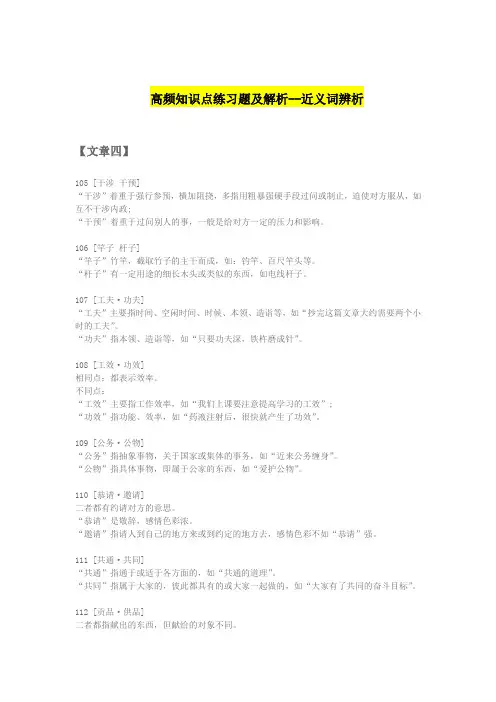
高频知识点练习题及解析--近义词辨析【文章四】105 [干涉干预]“干涉”着重于强行参预,横加阻挠,多指用粗暴强硬手段过问或制止,迫使对方服从,如互不干涉内政;“干预”着重于过问别人的事,一般是给对方一定的压力和影响。
106 [竿子杆子]“竿子”竹竿,截取竹子的主干而成,如:钓竿、百尺竿头等。
“杆子”有一定用途的细长木头或类似的东西,如电线杆子。
107 [工夫·功夫]“工夫”主要指时间、空闲时间、时候、本领、造诣等,如“抄完这篇文章大约需要两个小时的工夫”。
“功夫”指本领、造诣等,如“只要功夫深,铁杵磨成针”。
108 [工效·功效]相同点:都表示效率。
不同点:“工效”主要指工作效率,如“我们上课要注意提高学习的工效”;“功效”指功能、效率,如“药液注射后,很快就产生了功效”。
109 [公务·公物]“公务”指抽象事物,关于国家或集体的事务,如“近来公务缠身”。
“公物”指具体事物,即属于公家的东西,如“爱护公物”。
110 [恭请·邀请]二者都有约请对方的意思。
“恭请”是敬辞,感情色彩浓。
“邀请”指请人到自己的地方来或到约定的地方去,感情色彩不如“恭请”强。
111 [共通·共同]“共通”指通于或适于各方面的,如“共通的道理”。
“共同”指属于大家的,彼此都具有的或大家一起做的,如“大家有了共同的奋斗目标”。
112 [贡品·供品]二者都指献出的东西,但献给的对象不同。
“贡品”指古代臣民或属国贡献给帝王的物品,如“这是献给皇上的贡品”。
“供品”指供奉神佛或祖宗用的瓜果酒食等,如“摆上供品,以供鬼神享用”。
113 [沟通·勾通]二者都有使通之义,不同的是:“沟通”指使两方能通连,褒义,如“沟通感情”;“勾通”指暗中串通,勾结,贬义,如“他经常勾通土匪来村里骚扰”。
114 [苟合·媾合]“苟合”指男女间不正当地结合,贬义。
“媾合”指交战国缔结和约,结束战争,如“交战三年,不分胜负,双方只好媾合”。
小学语文基础专项练习:近义词辨析和选词填空
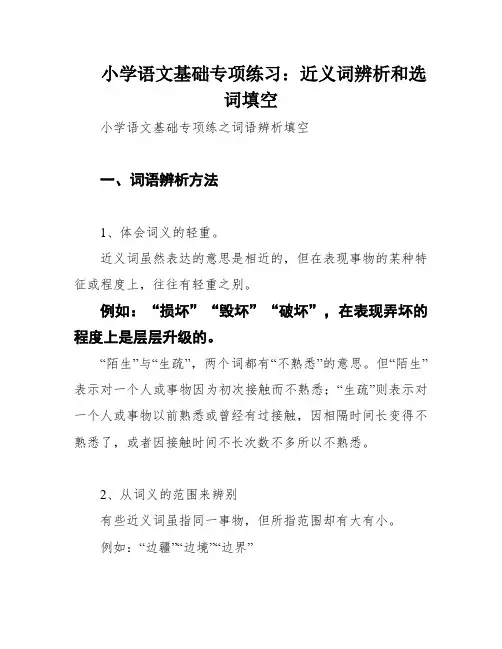
小学语文基础专项练习:近义词辨析和选词填空小学语文基础专项练之词语辨析填空一、词语辨析方法1、体会词义的轻重。
近义词虽然表达的意思是相近的,但在表现事物的某种特征或程度上,往往有轻重之别。
例如:“损坏”“毁坏”“破坏”,在表现弄坏的程度上是层层升级的。
“陌生”与“生疏”,两个词都有“不熟悉”的意思。
但“陌生”表示对一个人或事物因为初次接触而不熟悉;“生疏”则表示对一个人或事物以前熟悉或曾经有过接触,因相隔时间长变得不熟悉了,或者因接触时间不长次数不多所以不熟悉。
2、从词义的范围来辨别有些近义词虽指同一事物,但所指范围却有大有小。
例如:“边疆”“边境”“边界”“边疆”指远离中心的地方,靠近国界的领土,范围大,抽象。
“边境”指靠近国界的地方,范围较小,具体。
“边界”仅指一条界限,范围最小。
又如:“事情”“事件”“事故”“事情”包括小小的事,范围大;“事件”指不同寻常的重大事情,范围小;“事故”专指那些偶尔发生的不幸事情,范围最小。
3、从适用对象方面区分有些近义词在合用对象上往往有区别,主如果对象所处的地位分歧而合用的词语分歧。
例如“热爱”和“爱惜”都可用于人,但“热爱”只用于下辈对长辈,“爱惜”用于同志之间或长辈对长辈,上级对下级,偶然还用于物,如“爱惜公物”又如“希望”与“期望”。
“希望”可用于别人,也可用于自己;“期望”只用于对别人,且多用于长辈对晚辈,组织或集体对个人。
4、从词语搭配气区分。
如:改进——工作、方法、手艺改善——生活、关系、条件5、从词语性质方面区分有些近义词的词性分歧,在句子中的感化也分歧,如“勇敢”和“勇气”是一组近义词。
而在用法上,“勇敢”是形容词:勇敢的战士。
他真勇敢。
而“勇气”是名词:鼓起勇气。
又如“诞生”和“诞辰”。
6、从词语感情色彩上区分豪情色采即要区分是褒义词、贬义词还是中性词。
1(1)我国在航天手艺方面已经取得了重大成果。
(2)你如果不听劝告,那么一切后果由你自己负责。
词汇词义辨析技巧与练习题
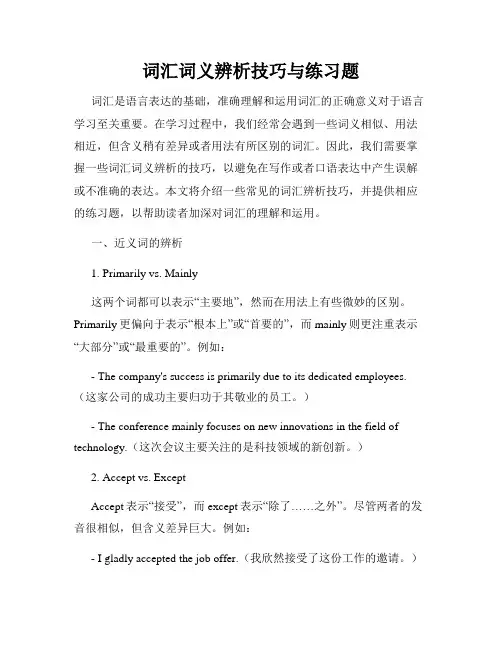
词汇词义辨析技巧与练习题词汇是语言表达的基础,准确理解和运用词汇的正确意义对于语言学习至关重要。
在学习过程中,我们经常会遇到一些词义相似、用法相近,但含义稍有差异或者用法有所区别的词汇。
因此,我们需要掌握一些词汇词义辨析的技巧,以避免在写作或者口语表达中产生误解或不准确的表达。
本文将介绍一些常见的词汇辨析技巧,并提供相应的练习题,以帮助读者加深对词汇的理解和运用。
一、近义词的辨析1. Primarily vs. Mainly这两个词都可以表示“主要地”,然而在用法上有些微妙的区别。
Primarily更偏向于表示“根本上”或“首要的”,而mainly则更注重表示“大部分”或“最重要的”。
例如:- The company's success is primarily due to its dedicated employees.(这家公司的成功主要归功于其敬业的员工。
)- The conference mainly focuses on new innovations in the field of technology.(这次会议主要关注的是科技领域的新创新。
)2. Accept vs. ExceptAccept表示“接受”,而except表示“除了……之外”。
尽管两者的发音很相似,但含义差异巨大。
例如:- I gladly accepted the job offer.(我欣然接受了这份工作的邀请。
)- Everyone is present except John.(除了约翰,大家都到齐了。
)3. Affect vs. Effect这两个词非常容易让人混淆。
Affect是一个动词,表示“影响”,而effect是一个名词,表示“结果”或“效果”。
例如:- The rainy weather affected our plans for a picnic.(下雨的天气影响了我们的野餐计划。
69组近义词辨析专项练习题(中考英语珍贵资料)
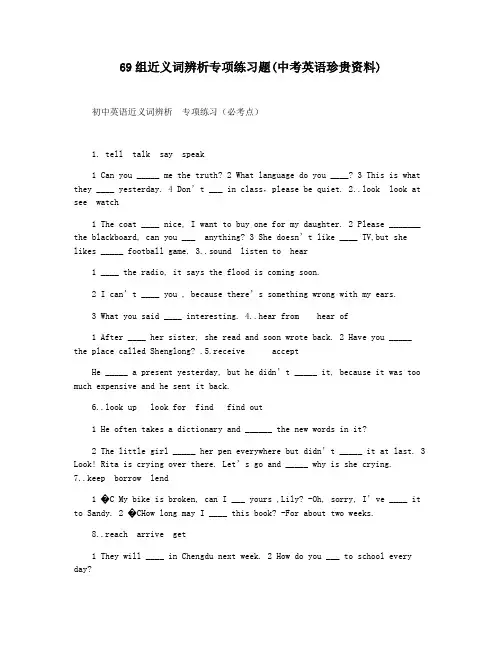
69组近义词辨析专项练习题(中考英语珍贵资料) 初中英语近义词辨析专项练习(必考点)1. tell talk say speak1 Can you _____ me the truth?2 What language do you ____?3 This is what they ____ yesterday.4 Don’t ___ in class,please be quiet. 2..look look at see watch1 The coat ____ nice, I want to buy one for my daughter.2 Please _______ the blackboard, can you ___ anything?3 She doesn’t like ____ TV,but she likes _____ football game. 3..sound listen to hear1 ____ the radio, it says the flood is coming soon.2 I can’t ____ you , because there’s something wrong with my ears.3 What you said ____ interesting. 4..hear from hear of1 After ____ her sister, she read and soon wrote back.2 Have you _____ the place called Shenglong? .5.receive acceptHe _____ a present yesterday, but he didn’t _____ it, because it was too much expensive and he sent it back.6..look up look for find find out1 He often takes a dictionary and ______ the new words in it?2 The little girl _____ her pen everywhere but didn’t _____ it at last.3 Look! Rita is crying over there. Let’s go and _____ why is she crying.7..keep borrow lend1 �C My bike is broken, can I ___ yours ,Lily? -Oh, sorry, I’ve ____ it to Sandy.2 �CHow long may I ____ this book? -For about two weeks.8..reach arrive get1 They will ____ in Chengdu next week.2 How do you ___ to school every day?3 Use a longer stick, then you can ____ the apples. 9..thanks to thanks for1 ______ your help, I’ve unde rstand it.2 ______ the cats, mice dare not come and eat my food. 10..give in give up11 We shouldn’t _____ learning English!2 I would rather die than _____ before my enemies. 11..achieve come true1 He works so hard that he is sure to___ his dream.2 His prediction of human’s flying to the moon _____. 12.turn off close turn on open1 _____ the windows please, it’s so cold outside.2 ____ the lightsbefore you leave the room. 3 The dog _____ the box and took the bone out!4 _____ the TV, I want to watch the NBA basketball games. 13.break off break out break into break down1 He was late for school yesterday, because his car ____ on the half way.2 The World WarⅡ ____ when she was only five.3 They ____ their friendship and didn’t talk to each other any more.4 Last night a thief _____ my house and took away my TV. 14. solve reply answersolve 解决(问题)及物动词常与problem 连用 reply 回复,答复不及物动词常与to连用 answer 回答及物动词常与question 连用 1 What did Mr Smith____ to what others said?2 No one in our class can ______ this question.3 It’s too difficult for everyone to ______ that problem. 15.hope wishhope 希望指较为现实的想法常有hope to do 或hope + 从句,但没有hope sb to dowish 希望指不太现实的要求或想法有wish to do 或 wish sb to do。
常见近义实词虚词辨析(练习答案) 2
常见近义实词虚词辨析练习1.把戏/伎俩【口语化】他一眼就识破了这骗人的把戏。
2.颁布/公布【搭配】《未成年人保护法》已经颁布多年了,但对未成年人的权益维护还很不如人意。
3.爆发/暴发【暴发:有两个意思。
第一指突然发财或得势,多含贬义,如暴发户,这一点不会与“爆发”混淆;第二指突然发作,多指自然具体的现象或事物突然发作,如洪水暴发。
爆发:作忽然发作讲时,多指人为的大的抽象的现象或情况,如力量情绪事变等忽然发作或发生。
另外,还可特指火山爆发。
】近年来,成都、南京、西安、武汉等许多大城市相继爆发报业大战,令广大读者大受其益。
4.卑劣/卑鄙【程度】台湾当局分裂祖国的卑劣行径,必将受到历史的惩罚。
5.必需/必须【“必须”是副词,不能修饰名词“燃料和原料”,“必需”多做形容词。
】煤炭和石油都是现代工业所必需的燃料和原料。
6.必需/必须【必须:表示事理情理上的必要、一定要,或用于加强命令语气。
必需:一定要有的,不可缺少的,相当于一个形容词,一般用于修饰名词,做定语。
】出发前个人要准备好生活必需品。
7.辨证/辩证/辨正【含义。
辨证:辨析考证。
辩证:形容看问题的眼光全面。
辨正:判断是非、正确错误】经专家多方辨证,这块石料就是有名的青田石中的鸡血石。
8.不齿/不耻【不齿:意为不愿意提到,表示鄙视。
】图书市场上部分作品从内容、写作手法到包装、宣传都极力媚俗,为文学界乃至许多读者所不齿。
9.裁决/裁定【裁决强调程序的最后一个环节。
裁定:斟酌决定其去取可否。
】上周,学校的校务委员会对这个问题作了最终的裁决。
10.抽象/概括【抽象:指从许多事物中,舍弃个别的、非本质的属性,抽出共同的、本质的属性。
概括:指把事物的共同特点归结在一起。
推求:指根据已知的条件或因素探索(道理、意图等)。
】价值最初是在商品交换中抽象出来的一个经济学概念。
11.出席/列席【出席:正式代表。
列席:非正式代表。
】李先生出席了这次大会,并做了精彩的发言。
小学辨析词义专项训练
小学辨析词义专项训练在小学阶段,学生对词汇的掌握和运用是语文学习的重要部分。
辨析词义是提高学生语言理解能力的关键环节。
本专项训练旨在帮助学生通过比较、分析和实践,加深对同义词、反义词、近义词等词汇的理解,从而提升语言表达的准确性和丰富性。
一、同义词辨析同义词是指意义相近或相同的词。
在辨析同义词时,学生需要关注词义的微妙差别和使用场合。
练习一:选择最合适的同义词1. 快乐与欢乐:- 我今天非常()。
- 节日的晚上,人们沉浸在()之中。
练习二:填空- 他()地接受了这个任务。
(乐意/愿意)二、反义词辨析反义词是指意义相反或相对的词。
辨析反义词有助于学生理解词义的对立关系。
练习一:写出下列词的反义词- 高:()- 快乐:()练习二:反义词填空- 这个房间很(),外面很冷。
(温暖)三、近义词辨析近义词是指意义相近但不完全相同的词。
辨析近义词时,要注意词义的侧重点和使用环境。
练习一:选择最合适的近义词- 聪明与智慧:- 他是一个()的孩子。
练习二:近义词填空- 这个问题很(),需要仔细思考。
(复杂/困难)四、多义词辨析多义词是指具有两个或两个以上意义的词。
辨析多义词需要学生根据上下文判断词义。
练习一:根据上下文选择正确的词义- 他把书放在桌子上。
(放:放置/放弃)练习二:多义词填空- 他()了这个机会。
(错过/失去)五、易混淆词辨析易混淆词是指在发音或拼写上容易混淆的词。
辨析这类词需要学生注意词的发音和拼写特点。
练习一:区分易混淆词- 站(zhan4)与占(zhan4):- 请在()上排队。
()练习二:易混淆词填空- 他()了第一名。
(赢得/赢利)六、词义扩展训练词义扩展是指词义在特定语境下的发展和变化。
通过词义扩展训练,学生可以更灵活地运用词汇。
练习一:词义扩展填空- 他()了这个问题。
(解决/处理)练习二:根据语境选择词义- 他()了这个项目。
(完成/结束)七、综合应用综合应用训练要求学生将所学知识运用到实际语境中,提高语言运用能力。
中考英语同义词与反义词辨析练习题50题
中考英语同义词与反义词辨析练习题50题1.She is a beautiful girl. She is also very _.A.handsomeB.prettyC.uglyD.bad答案:B。
“beautiful”意为美丽的,“pretty”也有漂亮的意思,是“beautiful”的近义词。
“handsome”通常用来形容男性帅气。
“ugly”是丑陋的,与“beautiful”意思相反。
“bad”是坏的,与“beautiful”没有直接关系。
2.The weather is very hot. It's also very _.A.coldB.warmC.coolD.hotter答案:B。
“hot”意为热的,“warm”有温暖的意思,比较接近“hot”。
“cold”是寒冷的,与“hot”相反。
“cool”是凉爽的,也与“hot”不同。
“hotter”是“hot”的比较级,这里没有比较的语境。
3.This book is interesting. It's also very _.A.boringB.excitingC.difficultD.easy答案:B。
“interesting”意为有趣的,“exciting”令人兴奋的,有相近的意思。
“boring”是无聊的,与“interesting”相反。
“difficult”是困难的,“easy”是容易的,都与“interesting”没有直接关系。
4.He is a tall boy. He is also very _.A.shortB.fatC.thinD.high答案:A。
“tall”意为高的,“short”是矮的,是反义词。
“fat”是胖的,“thin”是瘦的,“high”通常指物体高或者抽象的高,与形容人的“tall”不同。
5.The room is clean. It's also very _.A.dirtyB.bigC.smallD.bright答案:A。
《藤野先生》近义词辨析
《藤野先生》近义词辨析及练习鲁迅先生极善于把握近义词之间的细微差别,准确地遣词行文。
教学《藤野先生》(初中第五册)这一课,如能将里边的近义词适当地进行辨析比较,则对帮助学生深入理解作品的内容和作者的思想感情,丰富学生的词汇,培养他们准确选词造句的能力,都是很有意义的。
为了配合这一课的教学,笔者选取了几组近义词,着重在词义和用法的主要方面作些辨析,并辅之以一定的练习,供有关老师作备课参考。
[熟悉熟识]课文例句:①那坐在后面发笑的是上学年不及格的留级学生,在校已经一年,掌故颇为熟悉的了。
②有几个和我熟识的同学也很不平……辨析:这两个词都兼属动词和形容词,都含有“知道、了解”的意思。
主要区别是:“熟悉”是指“知道得比较清楚”,可用于人(如“熟悉学生”)和事物(如例①,指抽象事物;又如“熟悉山路”,指具体事物)。
“熟识”是指“了解得比较透彻”,一般常用以表示与人认识得比较久,相处得比较熟(如例②),很少用于事物,即运用范围比“熟悉”小。
练习(从本组近义词中选择一个合适的,填在横线上):1 他曾经在这一带地方工作过,所以对这里的情况比较。
2 这样边干边谈,等把抬筐收拾好,他俩已经成了很的朋友了。
(《普通劳动者》)[疑心疑惑]课文例句:①这藤野先生,据说是穿衣服太模胡了……有一回上火车去,致使管车的疑心他是扒手,叫车里的客人大家小心些。
②中国是弱国,所以中国人当然是低能儿,分数在六十分以上,便不是自己的能力了:也无怪他们疑惑。
辨析:这两个词都含有“怀疑某人某事可能怎么样”的意思。
主要区别是:“疑心”常作名词用,是指“怀疑的念头”(如“我完全是好意,你不要起疑心。
”);还可作动词用,相当于“怀疑”(如例①)。
“疑惑”是形容词,是“心里不明白”或“不相信”的意思(如例②)。
在句法功能上,“疑心”常作主语、宾语和谓语;“疑惑”多作谓语用。
此外,“疑心”可构成“多疑心”、“疑心病”、“疑心重重”、“疑心生暗鬼”;“疑惑”却不能。
- 1、下载文档前请自行甄别文档内容的完整性,平台不提供额外的编辑、内容补充、找答案等附加服务。
- 2、"仅部分预览"的文档,不可在线预览部分如存在完整性等问题,可反馈申请退款(可完整预览的文档不适用该条件!)。
- 3、如文档侵犯您的权益,请联系客服反馈,我们会尽快为您处理(人工客服工作时间:9:00-18:30)。
近义词辨析练习
独立独力
1.大众集团与梅赛德斯-奔驰呼吁汽车制造商搭建的数据平台,避免将敏感信息泄露给谷歌公司。
2. 由于近来市场热炒的银行、基建等板块周三处于全线回调之中,这使得周三发力上涨的券商板块显得有点难支。
淹没——湮没
3.失误,失误,还是失误,在全场30多次失误的深渊里,大鲨鱼自己被了。
4. 大量生动而充满了曲折故事的红色遗址,然而,随着岁月的流逝,其中有许许多多已湮没于历史的长河。
爆发——暴发
5. 11月11日独立日当天,一些华沙民族主义者都要举行游行活动,这已是连续第4年在独立日游行期间大规模骚乱。
6. 随着气温的降低,目前正进入腹泻疫情的高发期,专家提醒目前出现疫情的风险高,须注重防范。
义气——意气
权利——权力
寥廓——辽阔
11. “…一花不是春,孤雁难成行‟,让我们以北京雁栖湖为新的起点,引领世界经济的雁阵飞向更加蔚蓝而的天空。
12. :苍茫中的生命感怀以草原风情为主题的绘画创作,是孙志钧工笔画的重要特色。
斟酌——推敲
13.她特别感谢那段时间穷追不舍的买主,是他们让她看清现实,再昂贵的A货,都经不住时间的。
14.当下的世界,美国人横行无忌的时代已经过去,当美国人的话语涉及他国利益时,还是好好一下为上。
委屈——委曲
怂恿——纵容
桎梏——束缚
蛊惑——诱惑
21.约束权力需要制度,而改良环境,让广大公职人员远离“利益”、不被“亲情”所左右,也是科学的预防模式之一,也是恰当地让公职人员“自觉”远离腐败的有效做法。
22. 这是别有用心者的迷魂枪、伪命题,其目的是企图从“法治”问题上打开缺口, 群众、搞乱人心,进而否定党的领导和社会主义制度,把中国引向邪路。
蜕变——退化
消逝——消释
历程——里程
原型——原形
29.因此,市场料将密切关注日内晚间公布的劳动力市场现状指数,若数据向好则可能将金价打回,反之则能进一步提振金价。
30.上月舒布汉姆·班纳吉因开发出了低价Braille(盲文)打印机的产品,而获得英特尔投资的早期融资。
熟语的运用请在下列各句划横线处,填入恰当的熟语
啧有烦言安之若素一蹴而就登堂入室侧目而视如坐春风方兴未艾亡羊补牢
信而好古怙恶不悛始作俑者附庸风雅
1.车胎因路钉受损,市民往往,但无非是抱怨几句,叹息几声,希望下回谨慎小心,没有多少人会想
到自己该去除掉隐患。
2.人们对于自己的婚恋状态。
3.铁路货物快运不能,观念上的改变,需要有机制上的配合和跟进。
4.听其翻阅,则书非书也,不怒不威而引人之明师也。
5.然而眼下的高端培训成了聚拢政商人脉的“掮客班”,其趋势引得公众就不正常了。
6.陆法言感受到的风刀霜剑的逼迫,一个人躲在家中,他又想起那个的冬夜。
7.记者来到万里长城的西起点嘉峪关,感受这座1965年以关名建市的年轻城市的蓬勃活力与文化建设
的。
8.因此,针对IT故障管理,更多希望改善自身状况的IT部门,开始选择主动性的事前管理模式,而非被动
式的。
9.世人的风气,总是,轻视当下,追逐成功者,忽略新生代。
10.最让人喟叹的是,无论魏向民还是孔逸鸿皆非劣质斑斑,亦非之徒,相反,两人履历闪亮,甚至
可用警界俊杰来形容。
11.虽然这次事件让培训机构们站在了风口浪尖,但他们的作用可能更像是推波助澜,而不是。
12.可见,伪“书法家”有两个致命弱点:功底肤浅不说,还像“漂汤油”一样浮在上面,根本不了解基层群众的
精神文化需求,仅能而已。
